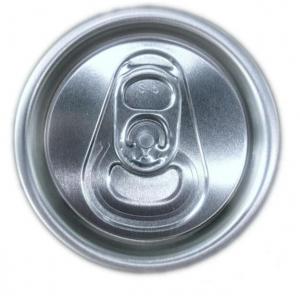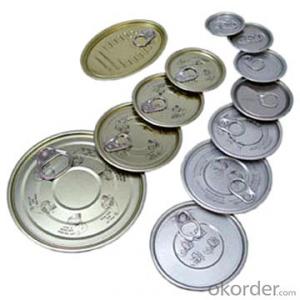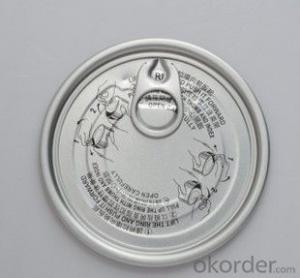Mill Finished Aluminium Coil for Can End
- Loading Port:
- China main port
- Payment Terms:
- TT or LC
- Min Order Qty:
- 100000 PCS
- Supply Capability:
- 10000000 PCS/month
OKorder Service Pledge
OKorder Financial Service
You Might Also Like
Item specifice
1.Specification
ALLOY:AA5182,AA5052
TEMPER:H19, H29
THICKNESS:0.22-0.26mm
WIDTH:600-1800mm
Special specification is available on customer's requirement
2.Description
5182 and AA5052 aluminum coil is an aluminum alloy that is commonly used in the production of can end. This aluminum alloy is ideal for the production of can end materials due to its excellent formability and corrosion resistance.
3.Pictures
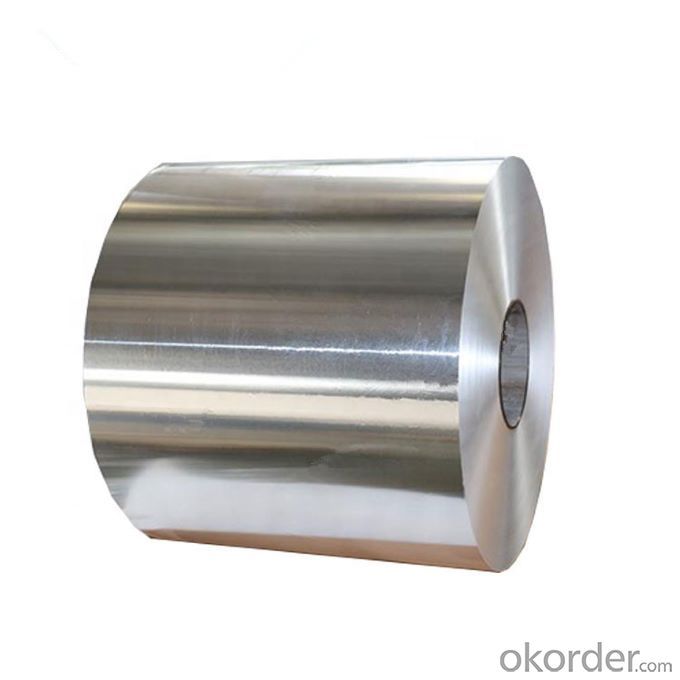
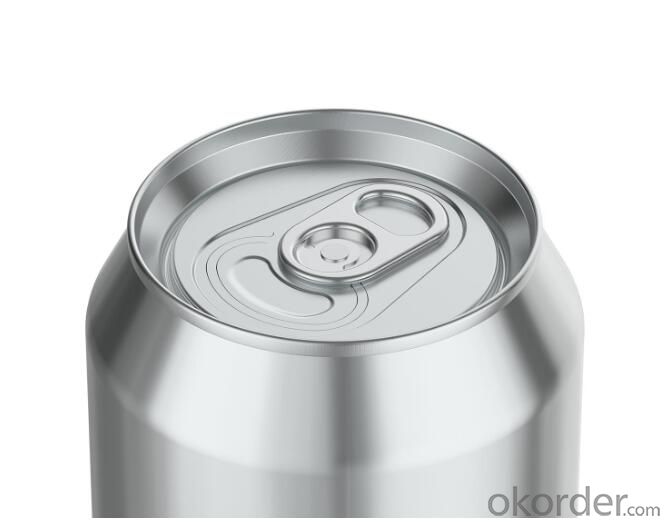
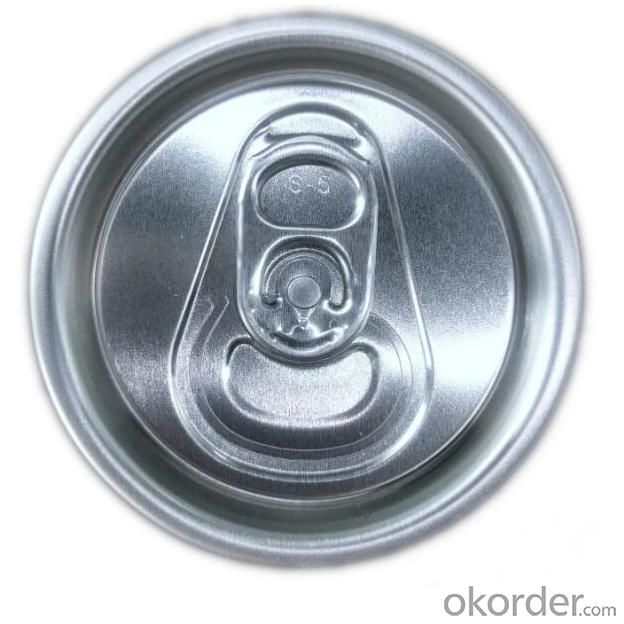
4.Professional Quality Control Team
Inspect ingot before melting
Inspecting aluminium coil /foil stock before cold rolling
Inspecting finished goods before package
Inspecting package, loading before shipment
5.Certificates
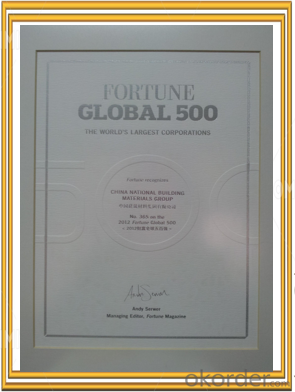
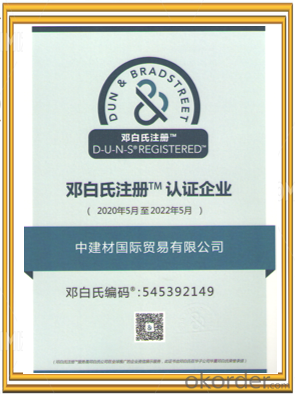
- Q:Are aluminum coils suitable for decorative applications?
- Indeed, decorative applications can benefit greatly from the use of aluminum coils. This versatile and lightweight material boasts exceptional corrosion resistance, rendering it an optimal selection for decorative purposes. Its ability to be effortlessly shaped, formed, and fabricated into a myriad of designs, patterns, and finishes grants endless possibilities in the realm of decoration. Furthermore, aluminum coils can be coated with various colors and finishes, including anodized or painted coatings, to augment both their aesthetic allure and durability. Thus, whether utilized for interior or exterior decoration, the utilization of aluminum coils offers a visually captivating and economically viable solution.
- Q:Can aluminum coils be used in the production of military equipment?
- Yes, aluminum coils can be used in the production of military equipment. Aluminum is a lightweight and corrosion-resistant material, making it suitable for various military applications, such as aircraft components, armored vehicles, and weapon systems. Its strength to weight ratio and ability to withstand harsh environments make it an ideal choice for military equipment manufacturing.
- Q:What are the different sizes and dimensions of aluminum coils available?
- The sizes and dimensions of aluminum coils vary depending on the manufacturer and specific application. However, common sizes range from 0.2mm to 6mm in thickness and 100mm to 2000mm in width. Lengths can vary as well, typically ranging from a few meters to several hundred meters. These dimensions can be customized to meet specific project requirements.
- Q:Can aluminum coils be used in agricultural applications?
- Yes, aluminum coils can be used in agricultural applications. Aluminum is a versatile and durable material that can withstand various environmental conditions, making it suitable for agricultural equipment such as irrigation systems, greenhouse structures, and ventilation systems. Additionally, aluminum's light weight and corrosion-resistant properties make it an ideal choice for agricultural applications where durability and long-term performance are essential.
- Q:What is the impact of alloy purity on the performance of aluminum coils?
- The purity of alloys used in aluminum coils has a significant impact on their performance. Alloy purity refers to the absence of impurities or contaminants within the aluminum material. One crucial factor affected by alloy purity is the mechanical strength of the aluminum coils. Impurities in the alloy can weaken the overall structure and reduce its tensile strength. Higher purity alloys tend to have better mechanical properties, allowing the coils to withstand higher loads and stresses without deformation or failure. Alloy purity also influences the electrical conductivity of aluminum coils. Impurities such as iron, copper, or silicon can increase the electrical resistance, leading to losses in electrical energy during transmission. Higher purity alloys have lower electrical resistivity, ensuring efficient power transmission and minimizing energy losses. Another critical aspect influenced by alloy purity is the corrosion resistance of aluminum coils. Impurities can act as catalysts for corrosion, reducing the coil's lifespan and durability. Higher purity alloys exhibit improved resistance to corrosion, making them suitable for various applications, including those in corrosive environments. Additionally, the thermal conductivity of aluminum coils is affected by alloy purity. Impurities hinder the efficient transfer of heat, reducing the overall thermal performance. Higher purity alloys have better thermal conductivity, allowing for effective heat dissipation and improved thermal management in applications such as heat exchangers or cooling systems. In conclusion, the impact of alloy purity on the performance of aluminum coils is significant. Higher purity alloys offer improved mechanical strength, electrical conductivity, corrosion resistance, and thermal conductivity. Thus, selecting alloys with higher purity levels is crucial for ensuring optimal performance and longevity of aluminum coils in various applications.
- Q:How are aluminum coils protected from damage during transportation?
- To protect aluminum coils during transportation, a combination of packaging materials and handling precautions is utilized. Initially, the coils are wrapped with materials like stretch film or plastic wrap to prevent scratches and abrasions, thus maintaining the coil's surface integrity and preventing potential damage. Moreover, the coils are typically placed on sturdy wooden pallets or skids, providing a stable base for transportation. This reduces movement and shifting during transit, avoiding dents or deformations in the coils. Additionally, steel or plastic strapping is used to secure the coils, ensuring their stability and preventing unintended unwrapping or unrolling. The straps are tightly fastened around the coils and pallets, creating a secure bundle capable of withstanding jostling and vibrations during transportation. During loading and unloading, specialized equipment like forklifts or cranes is employed to handle the coils carefully, reducing the risk of dropping or mishandling that could result in significant damage. In summary, a combination of protective packaging materials, secure pallets, and careful handling procedures is employed to protect aluminum coils during transportation. These measures aim to preserve the coils' quality and structural integrity, ensuring they reach their destination in optimal condition.
- Q:What is the role of aluminum coils in the transportation industry?
- Aluminum coils play a crucial role in the transportation industry due to their numerous advantageous properties. One of the primary uses of aluminum coils is in the manufacturing of transportation vehicles, such as cars, trucks, trains, and airplanes. Aluminum is a lightweight material, with a density significantly lower than steel, which makes it an ideal choice for enhancing fuel efficiency and reducing overall weight in transportation systems. The use of aluminum coils in transportation vehicles provides several benefits. Firstly, the lightweight nature of aluminum helps increase fuel efficiency, as vehicles require less energy to move with reduced weight. This results in lower fuel consumption, reduced greenhouse gas emissions, and cost savings for transportation companies. Moreover, aluminum coils possess excellent corrosion resistance properties, allowing transportation vehicles to withstand harsh weather conditions, such as rain, snow, and salt exposure. This durability is particularly essential for transportation vehicles that frequently operate in coastal or snowy regions. The resistance to corrosion also enhances the longevity of the vehicles, reducing maintenance costs and ensuring a longer lifespan. In addition to their weight and corrosion resistance properties, aluminum coils offer high strength-to-weight ratio, making them a reliable choice for structural components in transportation vehicles. This strength allows manufacturers to design lighter and more efficient vehicles without compromising safety or durability. Furthermore, aluminum coils contribute to the sustainability efforts of the transportation industry. Aluminum is a highly recyclable material, and the recycling process requires significantly less energy compared to its initial production. By utilizing aluminum coils in transportation vehicles, the industry can minimize its environmental impact and reduce the reliance on non-renewable resources. In conclusion, aluminum coils play a pivotal role in the transportation industry by contributing to fuel efficiency, corrosion resistance, lightweight design, structural strength, and sustainability. Their use in manufacturing transportation vehicles helps achieve cost savings, reduce emissions, enhance durability, and improve overall efficiency in the transportation sector.
- Q:Are the currently rentable U-Haul trailers or trucks made out of aluminum or fiberglass? Thanks!
- most of them are aluminum
- Q:What is the typical thermal conductivity of aluminum coils?
- The typical thermal conductivity of aluminum coils is approximately 205-220 W/mK. Aluminum is known for its excellent thermal conductivity, making it a popular choice for heat transfer applications such as in HVAC systems, refrigeration, and heat exchangers. The high thermal conductivity of aluminum allows for efficient heat dissipation and transfer, ensuring optimal performance and energy efficiency in these systems.
- Q:What are the different types of edge conditions for aluminum coils?
- There are several types of edge conditions for aluminum coils, including slit edge, mill edge, deburred edge, round edge, and beveled edge. Each type has specific characteristics and is used for different applications in industries such as construction, automotive, and aerospace.
1. Manufacturer Overview |
|
|---|---|
| Location | |
| Year Established | |
| Annual Output Value | |
| Main Markets | |
| Company Certifications | |
2. Manufacturer Certificates |
|
|---|---|
| a) Certification Name | |
| Range | |
| Reference | |
| Validity Period | |
3. Manufacturer Capability |
|
|---|---|
| a)Trade Capacity | |
| Nearest Port | |
| Export Percentage | |
| No.of Employees in Trade Department | |
| Language Spoken: | |
| b)Factory Information | |
| Factory Size: | |
| No. of Production Lines | |
| Contract Manufacturing | |
| Product Price Range | |
Send your message to us
Mill Finished Aluminium Coil for Can End
- Loading Port:
- China main port
- Payment Terms:
- TT or LC
- Min Order Qty:
- 100000 PCS
- Supply Capability:
- 10000000 PCS/month
OKorder Service Pledge
OKorder Financial Service
Similar products
New products
Hot products
Related keywords
